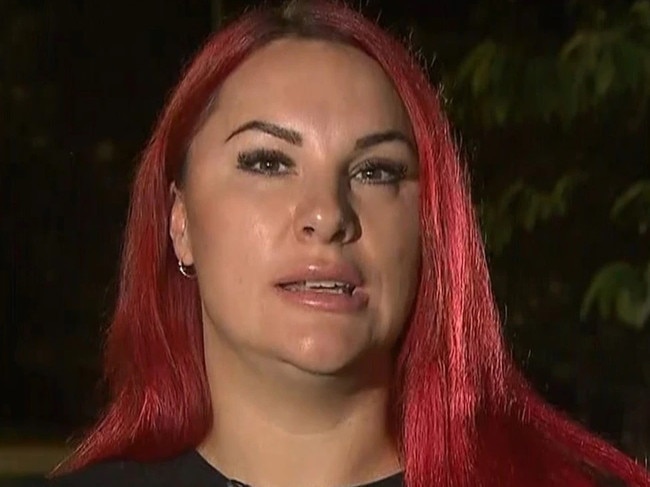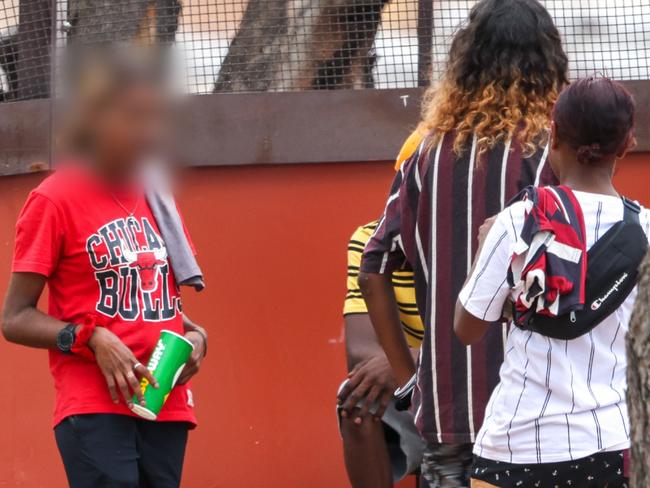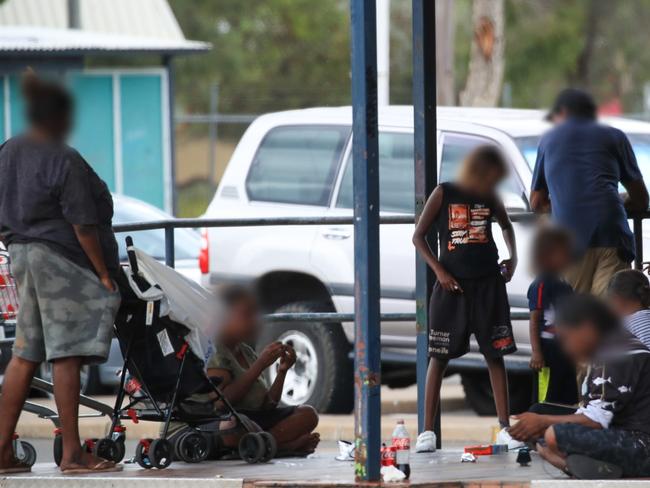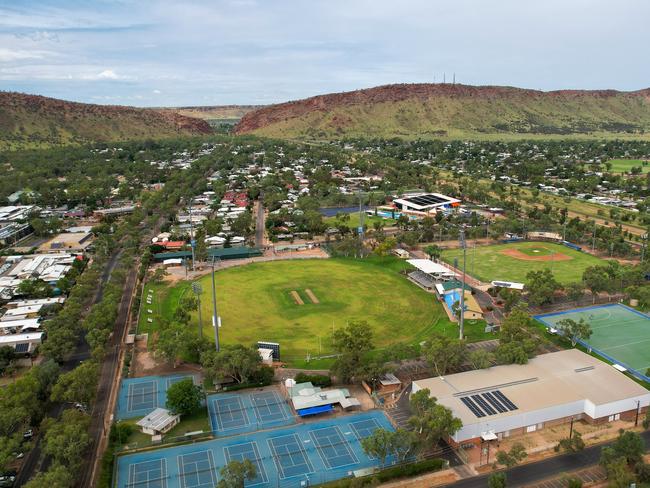‘What am I gaining out of this?’: Nurse who described Indigenous child abuse hits back at online threats
An NT nurse has hit back at a disturbing lie going viral online after speaking out about child sexual abuse in remote communities.
Lifestyle
Don't miss out on the headlines from Lifestyle. Followed categories will be added to My News.
EXCLUSIVE
A Northern Territory nurse says she has been inundated with “disgusting” messages and threats after speaking out about child sexual abuse plaguing many of Australia’s remote Indigenous communities.
Rachel Hale, 45, went viral after filming out-of-control youth attacking pub patrons in Alice Springs on Saturday — and later described how the horrific abuse at home was the reason many children roam the streets at night.
“It haunts me,” she told Channel 9’s Today on Tuesday, detailing graphic examples of the “level of trauma and shocking occurrences of sexual violence” she had witnessed.
But Ms Hale, a Darwin resident who visits the troubled town every two months for her cosmetic business, says she now fears for her safety after questions were raised about her background.
In one viral social media post, an employee at Alice Springs Hospital accused her of lying and said she was not registered with the Australian Health Practitioner Regulation Agency (AHPRA).
The post, which has since been deleted, claimed she was merely a cosmetic nurse who could not have witnessed the incidents she had described.
“She said I’m not a nurse and I’m spreading hate,” Ms Hale told news.com.au.
“She posted my personal details on Twitter with my number. People were like, ‘I’m going to find this b***h.’ From 7am yesterday morning I’ve had all these private numbers calling, people commenting on my business page, I had to shut down my personal Facebook. Just really disgusting, harassing [messages].”
Another commentator on YouTube argued social media post history suggested Ms Hale had been doing nothing but “squirting Botox” for the past seven years.
AHPRA records show an active division one nurse registration, first obtained in 2009, matching Ms Hale’s maiden name.

Responding to suggestions the timelines in her story did not add up, Ms Hale said she had been a cosmetic nurse on the side while also working at the Danila Dilba Aboriginal Health Service in Darwin.
“I’ve been working exclusively as a cosmetic nurse for the last two years,” she said. “This is why I got into cosmetic nursing — it almost broke me.”
Ms Hale said she had been in the Territory since 2011 and had worked for NT Health, in a prison and at an alcohol rehabilitation centre.
“I never said I worked in Alice,” she said.
“[The abuse] is the same everywhere. That’s not to say I don’t have colleagues in Alice Springs who see this stuff. My inbox is full of messages of support from healthcare workers saying we’re seeing the same thing.”
She stressed that she “never said every Indigenous community is like that, I’m just saying this is what I’ve seen in my career”.
“This is why these kids are out there every night,” she said. “I’m not after another stolen generation or intervention. I don’t want beautiful kids taken away from beautiful families.”
Ms Hale added that “of course” she flagged such incidents as a mandatory reporter.
“People are saying I didn’t report any of this — of course I did, it’s just part of the job,” she said. “But when you report that’s where it ends for you. Sometimes it’s not even you reporting, sometimes it’s your manager. It just goes to police.”
She said she had nothing to gain from speaking out.
“Everyone started calling me and messaging me, saying I’m a fake and I’ve never witnessed anything,” she said. “People are saying I’m just trying to promote my own profile. What am I gaining out of this? I knew I’d get blowback, I just didn’t think it would be this severe.”

Ms Hale said the attacks on her credibility appeared to be motivated by political views rather than a concern for children in remote communities.
“Yeah I work in a different profession now but it doesn’t discount what I’ve seen and what my colleagues have seen,” she said.
“It’s about these people boosting their own political and personal platforms and tearing me to shreds. It shouldn’t be about that. Is their goal for it to continue? Do they not want these kids to have help?”
Keith Gregory, 64, founder of the Guardians of Earth Foundation, a support group for Indigenous survivors of child sexual abuse, backed Ms Hale’s comments.
“Aboriginal people right across Australia think it’s an issue,” he said.
“You will find it is only a small group of Aboriginal people that will not agree with her, that will attack her. It’s very hard — she’s a human being, she’s a woman, she’s a mother, and she’s spoken out about children being abused. And we know the sexual abuse increases with alcohol.”
Mr Gregory said he had written to Alice Springs Hospital requesting an apology from the employee to Ms Hale.
“Unfortunately what has happened, they’re trying to force this into it being about racism and attacking black people or Aboriginal people,” he said. “That is just a diversionary tactic. It doesn’t matter whether it’s black or white, the issues around child sexual abuse, the community do not want to talk about it.”

It comes more than 15 years after the federal government’s Little Children are Sacred report, which found disturbing evidence of significant child sexual abuse in NT communities — and which prompted a number of new policies, including the Stronger Futures alcohol ban that lapsed last year.
Prime Minister Anthony Albanese and NT Chief Minister Natasha Fyles made an emergency visit to Alice Springs last week to announce temporary new restrictions on alcohol purchases in response to the crime wave.
On Thursday, the newly appointed Central Australian Regional Controller called for the reintroduction of alcohol bans, including in town camps, in her recommendations handed to the federal government.
Ms Fyles was due to meet with the PM later on Thursday to discuss Dorelle Anderson’s report. She said she had heard “loud and clear from not only the people in Central Australia, but across the NT, that we need to put in place measures that drive long-term change”.
“We absolutely need to have a collaborative approach to tackling these issues for the long term,” she said.
Ms Fyles said she did not want any measures introduced that disempowered Indigenous people and wants them at the centre of any decisions that would be made.
“The [Howard-era] intervention in the Northern Territory disempowered Indigenous people, it didn’t drive the long-term change,” she said.
“We saw a continuation of that with the Stronger Futures. Communities put in a lot of hard work, they did develop those alcohol management plans but unfortunately, they started here in Canberra. In terms of stepping forward … we have in place legislation that did provide that ability for dry communities to continue, and a number of communities reverted to being dry. Legislation we believe was not race-based.”

Shane Healey, 47, a terrorism and youth justice expert and former Alice Springs resident, said the reintroduction of alcohol bans would not fix the underlying problems.
“The problem is in the family groups, in the mobs,” he said.
Mr Healey, an Indigenous man originally from western NSW, said that the problem of domestic violence and child sexual abuse was widespread in other states.
“There was a study interviewing Indigenous kids in custody, and they all said the one thing at home that would make them feel safer would be to put a lock on their door,” he said.
“They’re having the same problems in northeast Queensland, in NSW — groups of Indigenous kids wandering the streets at night because it’s safer than at home.”
Mr Healey said ultimately the solutions had to come from the elders in the communities coming together with government to develop a plan.
“It’s not an overnight problem, it’s not even a five-year problem,” he said.
“I did 20 years in the Army — sending the Army into Alice is not going to fix Alice. You need positive Indigenous role models up there.”
He warned that if the family problems were not fixed, “the kids aren’t going to go home, they’re not going to go to school, not going to get an education”, and the intergenerational cycle would continue.
“Indigenous leaders are too busy blaming people for things they have no control over, rather than getting together and going to Alice to talk to the elders,” he said.
“[Indigenous Australians Minister] Linda Burney should be living in Alice at the moment and getting all these people up there for this purpose.”
The first thing he would do, Mr Healey said, would be to establish a government-funded boarding school that children facing family problems could attend voluntarily.
“Give them somewhere positive to go where they can learn life skills, play sports, how to do a trade, the power to get jobs, give them a bit of pride and self esteem — watch them flood in,” he said.
“Get them out of the environment they don’t want to be in. It’s a no-brainer.”
— with NCA NewsWire
More Coverage
Originally published as ‘What am I gaining out of this?’: Nurse who described Indigenous child abuse hits back at online threats





